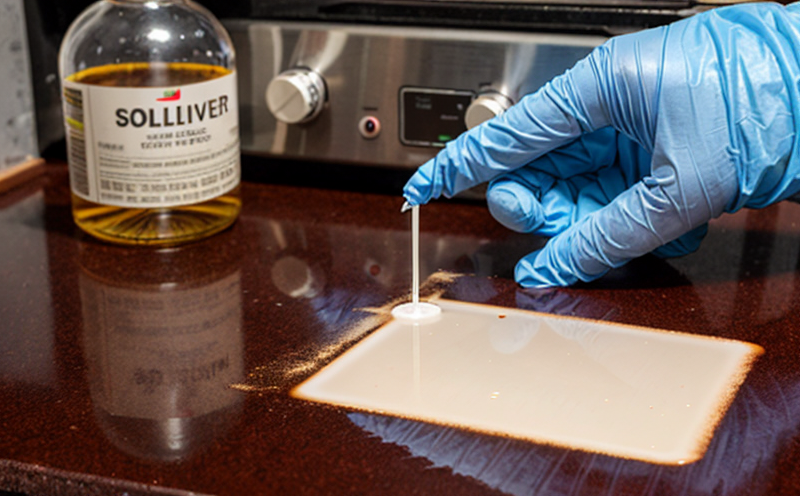Biodiesel Solvent Residue Testing
The testing of biodiesel for solvent residues is a critical step in ensuring product quality and compliance with international standards. This process involves identifying and quantifying any residual solvents that may be present in biodiesel, which can have significant implications on the fuel's performance characteristics. The presence of solvent residues, if excessive, can lead to issues such as increased viscosity, reduced oxidative stability, and potential engine deposits.
Biodiesel is typically produced through transesterification processes where triglycerides are converted into fatty acid methyl esters (FAME). During this process, solvents like methanol or ethanol may be used. After the reaction, it's essential to remove these solvents completely for optimal biodiesel quality. However, trace amounts of residual solvent can sometimes remain, which is why thorough testing is necessary.
The standard method for assessing solvent residues in biodiesel is outlined by ISO 16402:2014, which specifies a distillation procedure. This involves heating the sample to volatilize any present solvents, capturing them, and then measuring their volume or mass. The results provide critical insights into potential contamination issues that could affect fuel performance.
For accurate testing, proper specimen preparation is crucial. Samples should be representative of the batch being tested and free from external contaminants. Specimens are typically prepared by transferring a known quantity of biodiesel into an appropriate container for distillation. It's important to note that improper handling or storage conditions can introduce errors, so care must be taken throughout the process.
The equipment used in solvent residue testing includes a distillation apparatus capable of heating samples at controlled rates and collecting volatilized components. A balance is also essential for accurately weighing collected residues. Additionally, precise volumetric measurements may be required depending on the specific testing protocol.
Once tested according to ISO 16402:2014, the results are reported as the percentage of solvent residue remaining after distillation. Compliance with this standard ensures that biodiesel meets quality specifications and is suitable for use in various applications, including diesel engines.
In summary, biodiesel solvent residue testing plays a vital role in maintaining fuel quality by identifying potential contamination issues early on. By adhering to established standards like ISO 16402:2014, laboratories can provide reliable test results that help stakeholders make informed decisions regarding product quality and safety.
Applied Standards
Biodiesel solvent residue testing is governed by international standards such as ISO 16402:2014. This standard provides detailed procedures for determining the amount of residual solvents in biodiesel samples. Compliance with these guidelines ensures that testing methods are consistent across different laboratories, enhancing reliability and comparability of results.
The distillation process described by ISO 16402 involves heating the sample at a specified rate to volatilize any present solvent residues. These volatiles are then collected and measured, providing a quantitative assessment of the amount of residual solvents remaining in the biodiesel. This approach allows for accurate determination of compliance levels with respect to acceptable limits set forth by regulatory bodies.
Other relevant standards that may influence biodiesel testing include those related to overall fuel quality such as ISO 8217:2017. While not specifically targeting solvent residues, these broader standards ensure that biodiesel meets comprehensive performance criteria necessary for safe and efficient use in engines.
By adhering to these internationally recognized standards, laboratories can ensure their testing methods are up-to-date with the latest industry practices and regulatory requirements. This helps maintain trust among clients who rely on accurate and consistent test results from certified providers like ours.
International Acceptance and Recognition
- ISO 16402:2014
- American Petroleum Institute (API) standards
- European Biofuels Technology Platform guidelines
Biodiesel solvent residue testing is widely accepted internationally, with several key organizations recognizing the importance of this test. One notable standard is ISO 16402:2014, which sets out clear procedures for determining the amount of residual solvents in biodiesel samples. This standard has been adopted by numerous countries and recognized as an authoritative reference within the biofuels industry.
The American Petroleum Institute (API) also provides guidelines that complement ISO standards, particularly when it comes to quality assurance measures. These additional protocols further enhance the reliability and accuracy of solvent residue testing results. Similarly, European Biofuels Technology Platform guidelines emphasize the significance of such tests in ensuring consistent biofuel quality throughout Europe.
Recognition of these internationally accepted methods by various stakeholders underscores their importance in maintaining high standards within the biodiesel sector. Compliance with these standards not only ensures better fuel performance but also promotes environmental sustainability through cleaner burning fuels. By adhering to globally recognized norms, laboratories like ours contribute significantly towards fostering trust and confidence among clients worldwide.
Environmental and Sustainability Contributions
- Reduction of greenhouse gas emissions
- Promotion of renewable energy sources
- Enhanced air quality through cleaner burning fuels
Biodiesel solvent residue testing contributes significantly to environmental sustainability by ensuring that the biodiesel produced meets strict quality standards. One major benefit is the reduction in greenhouse gas emissions, as biodiesel derived from vegetable oils or animal fats burns more cleanly than traditional petroleum-based diesel. By promoting cleaner burning fuels like biodiesel with low solvent residues, we help minimize harmful pollutants and contribute to improved air quality.
In addition to reducing emissions, this testing also supports the use of renewable energy sources by encouraging the production and consumption of biofuels made from sustainable feedstocks such as waste cooking oils or dedicated oilseed crops. This shift towards greener alternatives helps mitigate dependency on fossil fuels while fostering economic growth in related industries.
Furthermore, ensuring proper solvent residue levels enhances the efficiency of engines using biodiesel, leading to better fuel economy and reduced maintenance costs for consumers. Cleaner burning engines result in less wear and tear, extending vehicle lifespan and reducing overall waste generation within society.
In conclusion, through rigorous testing of biodiesel for solvent residues, we play an important role in advancing environmental protection efforts globally. Our commitment to accuracy and consistency ensures that every batch of biodiesel processed meets stringent quality requirements, contributing positively towards a more sustainable future.





